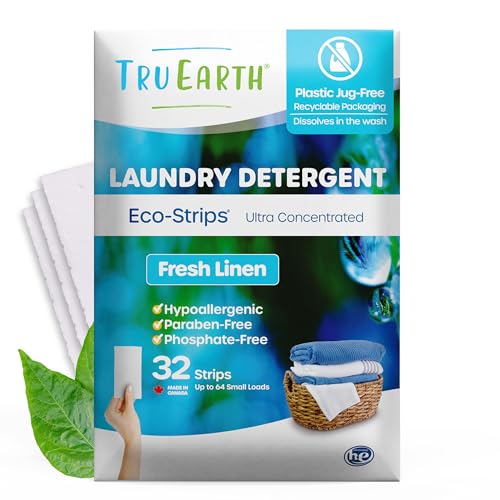
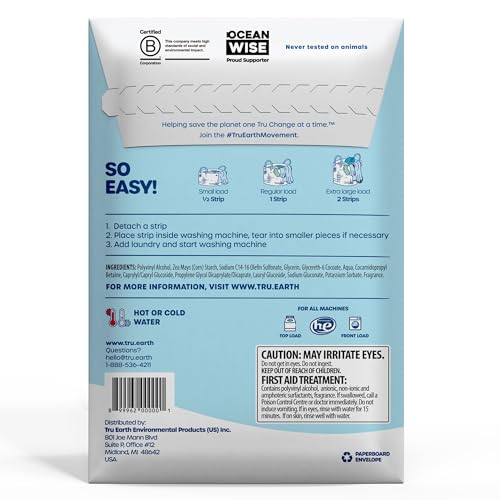
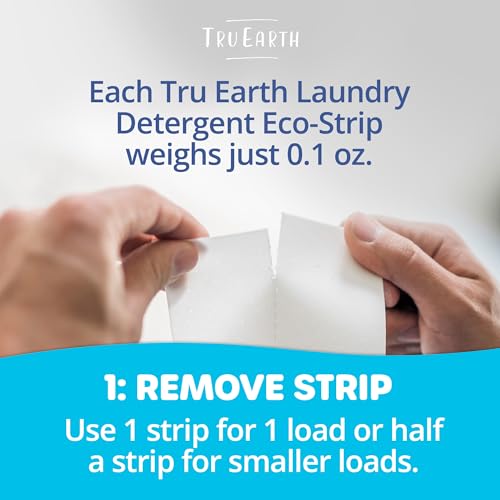
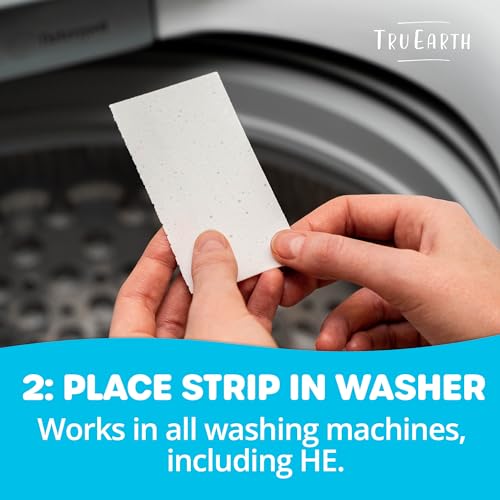
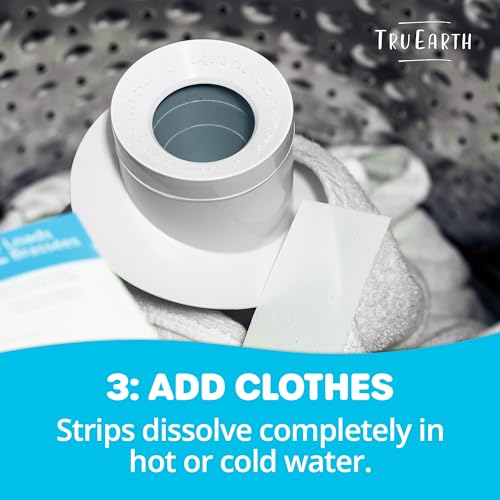
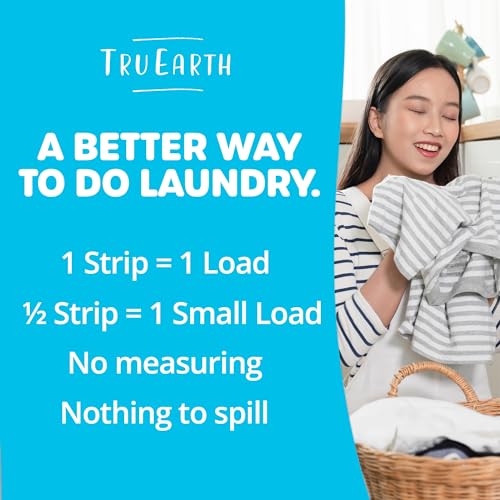
Tru Earth Laundry Detergent Sheets - Gentle on Skin, No Plastic, Fresh Linen - 32 Sheets


Cocamidopropyl Betaine
High RiskCocamidopropyl betaine is a synthetic surfactant derived from coconut oil, commonly used in personal care products for its mild cleansing and foaming properties. It functions as a surfactant, emulsifier, and thickening agent, contributing to the texture and performance of formulations.
Sustai Insights
Cocamidopropyl betaine offers functional benefits as a gentle surfactant, enhancing product foaming and texture. However, it may pose low to moderate allergenic risks and is subject to high use restrictions due to contamination concerns. Regulatory bodies have advised on its safe levels of usage, categorizing its risk level as high overall. Users should practice caution, particularly with sensitive populations, and consider alternatives like naturally derived surfactants for safer formulations.
Potassium Sorbate
Medium RiskPotassium sorbate is a potassium salt of sorbic acid, primarily used as a preservative in food and cosmetic products. It inhibits the growth of molds, yeast, and some bacteria, extending the shelf life of products. It is commonly found in various formulations due to its effectiveness and low toxicity.
Sustai Insights
Potassium sorbate serves as an effective preservative, preventing microbial growth in food and cosmetic products, which is vital for safety and longevity. Although it has a low risk of carcinogenicity and developmental toxicity, there is a moderate concern regarding allergies and immunotoxicity. Environmentally, it poses minimal risks as it is not significantly bioaccumulative. Regulatory agencies have verified its use, although some products may face restrictions. Overall, it is assessed as a medium risk ingredient, with safe usage practices recommended, and alternatives such as natural preservatives could be considered.
Caprylyl/ Capryl Glucoside
Low RiskCaprylyl/capryl glucoside is an alkyl glucoside derived from natural sources, commonly used as a surfactant and emulsifier in personal care products. It aids in the cleansing and foaming properties of formulations, enhancing the overall texture and performance without harsh effects.
Sustai Insights
Caprylyl/capryl glucoside serves effectively as a mild surfactant, providing gentle cleansing and emulsification. It is biodegradable and derived from renewable sources, contributing to its sustainability profile. However, it may cause mild skin irritation in sensitive individuals, and while its allergenic potential is low to moderate, caution is advised. Regulatory status indicates no significant restrictions, and overall risk assessment suggests a low risk for health and environmental impacts, making it a favorable option in formulations.
Vegetarian Glycerin
Low RiskVegetarian glycerin, also known as glycerol, is a colorless, odorless, and viscous liquid derived from plant sources. It is primarily used as a humectant, solvent, and emollient in various personal care products, helping to retain moisture and improve texture.
Sustai Insights
Vegetarian glycerin offers functional benefits as an effective humectant, promoting hydration and skin smoothness. It is biodegradable and typically sustainably sourced. Health risks associated with glycerin are low, with no significant concerns for carcinogenicity, allergens, or reproductive toxicity. Environmental risks are minimal, and it is not subject to major regulatory warnings. Overall, the risk level for this ingredient is low, making it a safe choice in formulations. Safe usage practices include ensuring proper concentrations in products, and alternatives such as propylene glycol exist but may have differing properties.
Polyglyceryl 2 Caprate
Low RiskPolyglyceryl-2 caprate is an ester derived from capric acid and polyglycerin-2, primarily used as an emulsifier in cosmetic formulations. It helps to blend oil and water-based ingredients, enhancing product texture and stability. This ingredient is recognized for its multifunctional properties in various personal care products.
Sustai Insights
Polyglyceryl-2 caprate offers functional benefits as an effective emulsifier, contributing to product stability and texture. It is considered to have low health risks, with minimal concerns regarding carcinogenicity, allergies, and irritation. Environmentally, it is not identified as a pollutant or bioaccumulative. Regulatory agencies do not impose significant restrictions on its use. Overall, the ingredient is assessed as low risk, making it a safe choice in cosmetic formulations with no significant adverse effects.
Water
Low RiskWater is a clear, colorless liquid essential for various biological processes. It serves as a solvent in formulations, facilitating the dissolution of other ingredients and enhancing product texture and application. Additionally, water plays a crucial role in hydration and is a key component in many cosmetic and personal care products.
Sustai Insights
Water is an effective solvent and hydrator, contributing to the texture and efficacy of formulations. It is biodegradable and generally regarded as safe, with low concerns regarding carcinogenicity, allergies, and reproductive toxicity. However, excessive water usage can lead to environmental concerns, particularly regarding resource depletion. Regulatory bodies do not impose restrictions on water use in cosmetics. Overall, the risks associated with water are low, making it a safe and essential ingredient.
Sodium Gluconate
Low RiskSodium gluconate is a sodium salt of gluconic acid, commonly used as a chelating agent in various personal care products. It functions primarily to bind metal ions, enhancing product stability and efficacy. Additionally, it may serve as a moisturizer and skin conditioning agent.
Sustai Insights
Sodium gluconate is valued for its functional benefits, including effective chelation and moisture retention, contributing positively to product performance. It is considered low risk concerning health impacts, with minimal concerns regarding carcinogenicity, allergies, or reproductive toxicity. Environmental assessments indicate low pollutant potential and minimal bioaccumulation. Regulatory bodies have not imposed significant restrictions. Safe usage practices are advised, particularly regarding enhanced skin absorption. Overall, sodium gluconate presents a low risk profile, making it a viable choice in personal care formulations.
Zea Mays (Corn) Starch
Low RiskZea mays (corn) starch is a starch obtained from corn kernels, primarily used as a thickening and stabilizing agent in various cosmetic and food products. It serves as a binder and enhances texture, contributing to the overall formulation's consistency and stability.
Sustai Insights
Zea mays (corn) starch offers functional benefits such as acting as a thickening and stabilizing agent, which helps improve product texture. It is sustainably sourced and biodegradable, posing low health risks, including negligible concerns for carcinogenicity and allergies. Environmental risks are minimal, with no significant pollutant potential noted. Regulatory bodies have not issued advisories, indicating a low overall risk level. Safe usage practices involve ensuring appropriate concentrations in formulations. Alternatives include other plant-based starches or thickeners, which may offer similar functional benefits while maintaining sustainability.
Polyvinyl Alcohol
Low RiskPolyvinyl alcohol is a synthetic polymer used in various applications, including adhesives, coatings, and as a film-forming agent in personal care products. It is known for its water-solubility and ability to create protective films.
Sustai Insights
Polyvinyl alcohol offers functional benefits as an effective film-former and emulsifier, and it is considered to have low health risks, with no significant concerns regarding carcinogenicity, allergies, or reproductive toxicity. Environmentally, it does not bioaccumulate and has low pollutant potential. Regulatory bodies have not imposed severe restrictions on its use. Despite its beneficial attributes, it is advisable to follow safe usage practices, particularly for sensitive populations. Overall, polyvinyl alcohol is assessed as low risk.
C14 16 Olefin Sulfonate
Low RiskC14-16 Olefin Sulfonate is a surfactant primarily used in personal care products for its cleansing and foaming properties. It is derived from olefins, which are hydrocarbons, and functions effectively in formulations requiring emulsification and dirt removal.
Sustai Insights
C14-16 Olefin Sulfonate serves as an effective surfactant and cleansing agent in various products, with low concerns regarding carcinogenicity, allergies, or reproductive toxicity. It is not currently subject to any use restrictions and is generally considered safe. Environmental risks are minimal, with low potential for pollution or bioaccumulation. Regulatory bodies do not issue significant warnings against its use. Overall, the risk level associated with C14-16 Olefin Sulfonate is low, making it a favorable option in formulations.
Caprylyl/ Capryl Glycoside
Low RiskCaprylyl/Capryl Glycoside is a surfactant derived from natural sources, primarily used in personal care and cosmetic products for its emulsifying properties. It helps to stabilize formulations and enhance cleaning efficacy while being gentle on the skin.
Sustai Insights
Caprylyl/Capryl Glycoside offers functional benefits as a mild surfactant and emulsifier, contributing to product stability without significant irritation. It is biodegradable and considered sustainably sourced. Health risks are low, with minimal concerns regarding carcinogenicity and developmental toxicity. Environmental impact is also low, as it does not accumulate in ecosystems. Regulatory assessments indicate no current restrictions. Overall, it presents a low risk profile, making it a suitable choice in formulations.
Cocamidopropyl Betaine
High RiskCocamidopropyl betaine is a synthetic surfactant derived from coconut oil, commonly used in personal care products for its mild cleansing and foaming properties. It functions as a surfactant, emulsifier, and thickening agent, contributing to the texture and performance of formulations.
Sustai Insights
Cocamidopropyl betaine offers functional benefits as a gentle surfactant, enhancing product foaming and texture. However, it may pose low to moderate allergenic risks and is subject to high use restrictions due to contamination concerns. Regulatory bodies have advised on its safe levels of usage, categorizing its risk level as high overall. Users should practice caution, particularly with sensitive populations, and consider alternatives like naturally derived surfactants for safer formulations.
Caprylyl/ Capryl Glucoside
Low RiskCaprylyl/capryl glucoside is an alkyl glucoside derived from natural sources, commonly used as a surfactant and emulsifier in personal care products. It aids in the cleansing and foaming properties of formulations, enhancing the overall texture and performance without harsh effects.
Sustai Insights
Caprylyl/capryl glucoside serves effectively as a mild surfactant, providing gentle cleansing and emulsification. It is biodegradable and derived from renewable sources, contributing to its sustainability profile. However, it may cause mild skin irritation in sensitive individuals, and while its allergenic potential is low to moderate, caution is advised. Regulatory status indicates no significant restrictions, and overall risk assessment suggests a low risk for health and environmental impacts, making it a favorable option in formulations.
Vegetarian Glycerin
Low RiskVegetarian glycerin, also known as glycerol, is a colorless, odorless, and viscous liquid derived from plant sources. It is primarily used as a humectant, solvent, and emollient in various personal care products, helping to retain moisture and improve texture.
Sustai Insights
Vegetarian glycerin offers functional benefits as an effective humectant, promoting hydration and skin smoothness. It is biodegradable and typically sustainably sourced. Health risks associated with glycerin are low, with no significant concerns for carcinogenicity, allergens, or reproductive toxicity. Environmental risks are minimal, and it is not subject to major regulatory warnings. Overall, the risk level for this ingredient is low, making it a safe choice in formulations. Safe usage practices include ensuring proper concentrations in products, and alternatives such as propylene glycol exist but may have differing properties.
Polyglyceryl 2 Caprate
Low RiskPolyglyceryl-2 caprate is an ester derived from capric acid and polyglycerin-2, primarily used as an emulsifier in cosmetic formulations. It helps to blend oil and water-based ingredients, enhancing product texture and stability. This ingredient is recognized for its multifunctional properties in various personal care products.
Sustai Insights
Polyglyceryl-2 caprate offers functional benefits as an effective emulsifier, contributing to product stability and texture. It is considered to have low health risks, with minimal concerns regarding carcinogenicity, allergies, and irritation. Environmentally, it is not identified as a pollutant or bioaccumulative. Regulatory agencies do not impose significant restrictions on its use. Overall, the ingredient is assessed as low risk, making it a safe choice in cosmetic formulations with no significant adverse effects.
Potassium Sorbate
Medium RiskPotassium sorbate is a potassium salt of sorbic acid, primarily used as a preservative in food and cosmetic products. It inhibits the growth of molds, yeast, and some bacteria, extending the shelf life of products. It is commonly found in various formulations due to its effectiveness and low toxicity.
Sustai Insights
Potassium sorbate serves as an effective preservative, preventing microbial growth in food and cosmetic products, which is vital for safety and longevity. Although it has a low risk of carcinogenicity and developmental toxicity, there is a moderate concern regarding allergies and immunotoxicity. Environmentally, it poses minimal risks as it is not significantly bioaccumulative. Regulatory agencies have verified its use, although some products may face restrictions. Overall, it is assessed as a medium risk ingredient, with safe usage practices recommended, and alternatives such as natural preservatives could be considered.
Water
Low RiskWater is a clear, colorless liquid essential for various biological processes. It serves as a solvent in formulations, facilitating the dissolution of other ingredients and enhancing product texture and application. Additionally, water plays a crucial role in hydration and is a key component in many cosmetic and personal care products.
Sustai Insights
Water is an effective solvent and hydrator, contributing to the texture and efficacy of formulations. It is biodegradable and generally regarded as safe, with low concerns regarding carcinogenicity, allergies, and reproductive toxicity. However, excessive water usage can lead to environmental concerns, particularly regarding resource depletion. Regulatory bodies do not impose restrictions on water use in cosmetics. Overall, the risks associated with water are low, making it a safe and essential ingredient.
Sodium Gluconate
Low RiskSodium gluconate is a sodium salt of gluconic acid, commonly used as a chelating agent in various personal care products. It functions primarily to bind metal ions, enhancing product stability and efficacy. Additionally, it may serve as a moisturizer and skin conditioning agent.
Sustai Insights
Sodium gluconate is valued for its functional benefits, including effective chelation and moisture retention, contributing positively to product performance. It is considered low risk concerning health impacts, with minimal concerns regarding carcinogenicity, allergies, or reproductive toxicity. Environmental assessments indicate low pollutant potential and minimal bioaccumulation. Regulatory bodies have not imposed significant restrictions. Safe usage practices are advised, particularly regarding enhanced skin absorption. Overall, sodium gluconate presents a low risk profile, making it a viable choice in personal care formulations.
Zea Mays (Corn) Starch
Low RiskZea mays (corn) starch is a starch obtained from corn kernels, primarily used as a thickening and stabilizing agent in various cosmetic and food products. It serves as a binder and enhances texture, contributing to the overall formulation's consistency and stability.
Sustai Insights
Zea mays (corn) starch offers functional benefits such as acting as a thickening and stabilizing agent, which helps improve product texture. It is sustainably sourced and biodegradable, posing low health risks, including negligible concerns for carcinogenicity and allergies. Environmental risks are minimal, with no significant pollutant potential noted. Regulatory bodies have not issued advisories, indicating a low overall risk level. Safe usage practices involve ensuring appropriate concentrations in formulations. Alternatives include other plant-based starches or thickeners, which may offer similar functional benefits while maintaining sustainability.
Polyvinyl Alcohol
Low RiskPolyvinyl alcohol is a synthetic polymer used in various applications, including adhesives, coatings, and as a film-forming agent in personal care products. It is known for its water-solubility and ability to create protective films.
Sustai Insights
Polyvinyl alcohol offers functional benefits as an effective film-former and emulsifier, and it is considered to have low health risks, with no significant concerns regarding carcinogenicity, allergies, or reproductive toxicity. Environmentally, it does not bioaccumulate and has low pollutant potential. Regulatory bodies have not imposed severe restrictions on its use. Despite its beneficial attributes, it is advisable to follow safe usage practices, particularly for sensitive populations. Overall, polyvinyl alcohol is assessed as low risk.
C14 16 Olefin Sulfonate
Low RiskC14-16 Olefin Sulfonate is a surfactant primarily used in personal care products for its cleansing and foaming properties. It is derived from olefins, which are hydrocarbons, and functions effectively in formulations requiring emulsification and dirt removal.
Sustai Insights
C14-16 Olefin Sulfonate serves as an effective surfactant and cleansing agent in various products, with low concerns regarding carcinogenicity, allergies, or reproductive toxicity. It is not currently subject to any use restrictions and is generally considered safe. Environmental risks are minimal, with low potential for pollution or bioaccumulation. Regulatory bodies do not issue significant warnings against its use. Overall, the risk level associated with C14-16 Olefin Sulfonate is low, making it a favorable option in formulations.
Caprylyl/ Capryl Glycoside
Low RiskCaprylyl/Capryl Glycoside is a surfactant derived from natural sources, primarily used in personal care and cosmetic products for its emulsifying properties. It helps to stabilize formulations and enhance cleaning efficacy while being gentle on the skin.
Sustai Insights
Caprylyl/Capryl Glycoside offers functional benefits as a mild surfactant and emulsifier, contributing to product stability without significant irritation. It is biodegradable and considered sustainably sourced. Health risks are low, with minimal concerns regarding carcinogenicity and developmental toxicity. Environmental impact is also low, as it does not accumulate in ecosystems. Regulatory assessments indicate no current restrictions. Overall, it presents a low risk profile, making it a suitable choice in formulations.
Discover the power of Tru Earth Compact Dry Laundry Detergent Sheets, an eco-friendly solution designed for the modern consumer. These laundry strips provide a convenient, mess-free way to achieve a deep clean without compromising on sustainability.
- Compact Convenience: Each sheet weighs just 3g and perfectly fits in your travel bag or laundry room, saving valuable space compared to traditional jugs.
- Gentle Formula: Paraben-free and vegan-friendly, these sheets are safe for sensitive skin, making laundry day a worry-free experience.
- No Plastic Jugs: The eco-conscious design reduces plastic waste significantly, contributing to a smaller carbon footprint while keeping your laundry fresh.
- Easy to Use: Simply toss in a sheet per load—no measuring or mess, allowing for a hassle-free laundry routine.
- Exceptional Cleaning Power: Effectively removes stains, brightens whites, and restores colors, making it ideal for everyday use or travel essentials.
Tru Earth is committed to sustainable practices, ensuring every wash is a step toward a healthier planet.
Subscribe & Save with Sustai
- Best Price Guarantee: Always enjoy the lowest prices on sustainable home essentials.
- No Surprises: We’ll notify you before shipping. No hidden fees, ever.
- You’re in Charge: Change, pause, or cancel your subscription anytime with ease.
- Eco-Friendly Deliveries: Our grouped shipments mean less packaging and lower emissions.
Join us on a sustainable journey. Special offers for a limited time! Prices and promotions may change.
Recommended Products
Discover the power of Tru Earth Compact Dry Laundry Detergent Sheets, an eco-friendly solution designed for the modern consumer. These laundry strips provide a convenient, mess-free way to achieve a deep clean without compromising on sustainability.
- Compact Convenience: Each sheet weighs just 3g and perfectly fits in your travel bag or laundry room, saving valuable space compared to traditional jugs.
- Gentle Formula: Paraben-free and vegan-friendly, these sheets are safe for sensitive skin, making laundry day a worry-free experience.
- No Plastic Jugs: The eco-conscious design reduces plastic waste significantly, contributing to a smaller carbon footprint while keeping your laundry fresh.
- Easy to Use: Simply toss in a sheet per load—no measuring or mess, allowing for a hassle-free laundry routine.
- Exceptional Cleaning Power: Effectively removes stains, brightens whites, and restores colors, making it ideal for everyday use or travel essentials.
Tru Earth is committed to sustainable practices, ensuring every wash is a step toward a healthier planet.

You can have at most 2 Sustainable Steals products in your cart
Customer Reviews
Customers’ View
Customers appreciate the effectiveness and eco-friendly nature of Tru Earth Laundry Detergent Sheets. Many reviews highlight the product's ability to clean effectively, with users noting it successfully removes stains from grass and dirt while being gentle on sensitive skin. The fresh linen scent is well-received, described as clean and not overpowering. Additionally, the compact and plastic-free packaging is a significant benefit for those looking to minimize their environmental impact. Many customers value the convenience and ease of use, noting that the sheets simplify laundry routines. Overall, customers find this product both effective and aligned with their sustainable lifestyle.
AI-generated from the text of customer reviewsThis product is rated 4.4 of 5.0 stars.
It has received 66 reviews.




